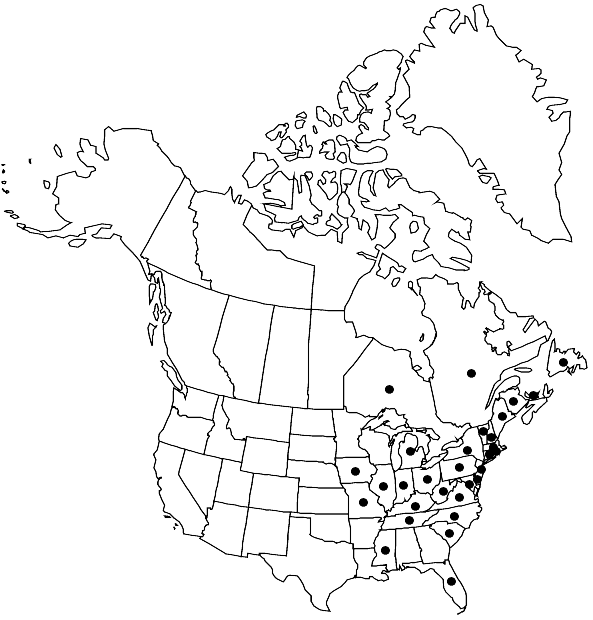Atrichum crispum
in A. Gray, Manual ed. 2, 641. 1856,.
Plants small to moderately robust, yellowish green or rarely dark green, brown proximally with age. Stems 1–5 cm. Leaves 1–8.5 × 0.7–2 mm, ovate-lanceolate to ovate, sometimes lingulate to lanceolate near stem apex, plane to somewhat concave, not undulate, only rarely with scattered abaxial teeth, apex acute, border cells and teeth with minute, verrucose or striate papillae; costa percurrent to subpercurrent, with a few abaxial teeth near apex, rarely absent; lamellae 0–3(–4), often discontinuous, 1–4 cells high; median leaf cells 35–52 µm wide, hexagonal to irregularly angled, rarely rounded, thin-walled, not or weakly collenchymatous, without trigones, smooth. Sexual condition dioicous, male plants as large as female plants or larger; perigonial bracts ovate to suborbicular, forming antheridial buds, often more than one bud per plant. Seta 1–3 per perichaetium, 0.5–3 cm. Capsule 1–3.5 × 0.5–1 mm, cylindric to ovate, usually somewhat curved, erect or often inclined; operculum 1.5–3.5 mm. Spores 10–28 µm.
Phenology: Capsules mature spring–summer (Apr–June).
Habitat: Sandy soil along streams, roadside ditches in shaded habitats, sometimes at margins of swamps and marshes, rarely on rotting logs in woods
Elevation: low to moderate elevations
Distribution

N.B., Nfld. and Labr. (Nfld.), N.S., Ont., P.E.I., Que., Conn., Del., Fla., Ill., Ind., Iowa, Ky., Maine, Md., Mass., Mich., Mo., N.H., N.J., N.Y., N.C., Ohio, Pa., R.I., S.C., Tenn., Vt., Va., W.Va., introduced in Europe.
Discussion
Atrichum crispum is frequent in the Atlantic coastal plain but also occurs at higher elevations in the mountains. It is apparently introduced in Europe (Ireland, western England, Wales, and Spain) where only male plants are known. This is a dioicous species, the plants varying in size from small to large, often yellowish green, leaves with a few low and often interrupted lamellae, and large, thin-walled leaf cells without trigones, with few or no teeth on the abaxial surface of lamina. The most distinctive microscopic character is the minute, verrucose or striate papillae on the marginal cells and teeth of the leaves (R. R. Ireland 1991). The marginal cilia on the leaf sheath of Bartramiopsis are similarly papillose.
Selected References
None.